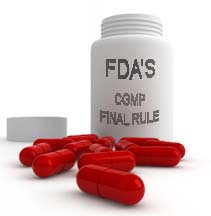 In June 2007, the U.S. Food and Drug Administration issued the dietary supplement current good manufacturing practice (CGMP) final rule (21 CFR Part 111). In essence, the final rule requires that the proper controls be in place for dietary supplements during manufacturing, packaging, labeling, and holding operations.
In June 2007, the U.S. Food and Drug Administration issued the dietary supplement current good manufacturing practice (CGMP) final rule (21 CFR Part 111). In essence, the final rule requires that the proper controls be in place for dietary supplements during manufacturing, packaging, labeling, and holding operations.
Purpose of the CGMP final rule
The purpose of the CGMP final rule is to establish quality standards for dietary supplements. Until recently, the Food and Drug Administration has tended to view itself as filling more of a watchdog role as far as dietary supplements are concerned, with the FDA's MedWatch consumer complaints hotline serving as the alert system.
This watchdog role led to the voluntary recall of the dietary supplement Nasutra in September 2006, after it was discovered that the dietary supplement contained an analogue of sildenafil (acetildenafil), the active pharmaceutical ingredient in Viagra.
According the FDA press release announcing the recall, “Acetildenafil is an analogue of sildenafil. Sildenafil is the active pharmaceutical ingredient in Viagra, an FDA-approved drug that is used to treat erectile dysfunction (ED). Acetildenafil is close in structure to sildenafil and is expected to possess a similar pharmacological and adverse event profile.”
…
Add new comment